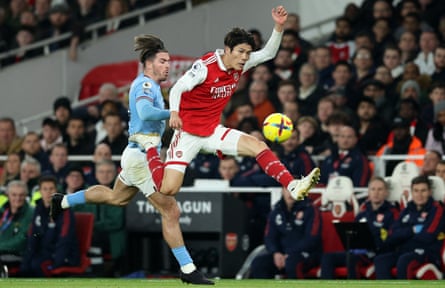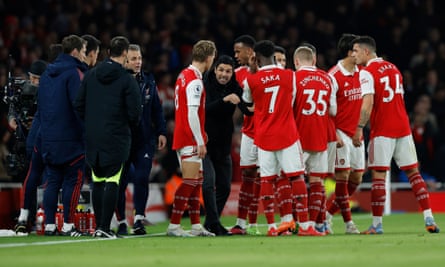[ad_1]
What if the Queen hadn’t died when she did? If she hadn’t, Arsenal would have faced PSV Eindhoven in the Europa League in September and that game wouldn’t have had to be played in the midweek slot when they had been slated to host Manchester City.
Arsenal would have gone into what could prove the defining game of the season in October on a run of seven straight victories, having beaten Tottenham and Liverpool in their previous two home league matches, while City would have been coming off a 1-0 defeat at Anfield. As it was, Arsenal were fretting in their worst run of the season, while City were just beginning to emerge from a post-World Cup blip. But still they’ll blame the referees.
Arsenal are level at the top with a game in hand, but the sense of momentum has gone. It’s true they will win the league if they draw at City in April and win their other 15 games – and few before the season began would have predicted anything like that – but nobody at the club can be looking beyond Aston Villa on Saturday and getting out of this run of four games without a victory. Having dropped seven points in the first half of the season, they have let eight go in the first three games of the second. Eight-point leads, once squandered, are seldom regained.
The slump began at City in the FA Cup. At the time, a 1-0 defeat felt almost like the perfect result for Arsenal: even with a weakened team there had been no sense they couldn’t live with the champions and space had been opened in the calendar to focus on the more important competition. But that defeat broke the run.
Nobody could realistically criticise Mikel Arteta for resting players given the slenderness of his squad, but it was as though that was the moment when, having gone chasing off the cliff, they glanced down and realised this progress wasn’t sustainable, that gravity was going to get them in the end.
How much longer could they have gone on, defying football’s natural financial laws? There’s always misfortune to be blamed. Perhaps they were unlucky then to meet Everton enjoying the first (only?) game of a Sean Dyche bounce, but however tenacious Goodison’s new dogs of war were in midfield, there was also a sense Arsenal were flat. The zip had gone.
Fatigue is almost impossible to prove in football and is often little more than a convenient post-hoc rationalisation. Only those with access to intimate medical data can say with any certainty whether players are physically exhausted and even those stats can’t account for mental weariness. But the fear for Arsenal had always been they would run out of steam and, recently, steam has looked in very short supply.
Against Brentford, the VAR official, Lee Mason, was understandably blamed for becoming so fixated on a possible blocking run by Ethan Pinnock that he failed to consider whether Christian Nørgaard was offside in squaring for Ivan Toney to equalise, but there is rarely only one factor at play. Brentford had by far the better chances in the first half: they could easily have been two or three up. To focus on that one refereeing error, to blame that for Arsenal’s sputter, is to ignore the bigger picture.

Arsenal had their chance against City. By Pep Guardiola’s own admission he got the tactics wrong in the first half, with Bernardo Silva an unconvincing left-back torn apart by Bukayo Saka. At half- time, Arsenal had had 59.5% of the ball. They had had opportunities. Eddie Nketiah had put a free header wide. Saka had dithered in a good position. City had struggled to create chance until Takehiro Tomiyasu’s duff back pass.
after newsletter promotion
What if Arteta had stuck with Ben White at right-back? Even then, for those minded to do so, it was possible to look at the refereeing. What if Silva had been booked for his second or third foul on Saka rather than his fourth? Might he then have been sent off before Guardiola could reorganise? What might Arsenal have been able to do against 10 players?
But Guardiola was able to rejig and City in the second half were by far the better side. They scored twice, had an effort cleared off the line and were denied a penalty only by a narrow offside. Might it have been different had Thomas Partey been fit or Arsenal managed to sign Moisés Caicedo rather than Jorginho as back-up? Might they have had more of a chance of regaining the initiative had they landed Mykhaylo Mudryk rather than Leandro Trossard?

Perhaps, and that leads to a form of economic determinism that perhaps comes closest to an overall explanation for who wins titles: City have the most resources, so they can afford the best manager and the best players and provide for them the best facilities. Perhaps financial gravity was always going to catch up with Arsenal. But such things are rarely singular or simple and there may be twists in this season’s title race. Arsenal may come again but it doesn’t seem likely.
What if the Queen hadn’t died when she did? What if the game had been played in October? For want of a nail, the kingdom was lost.
[ad_2]
#Arsenal #steam #financial #gravity #brings #Jonathan #WIlson
( With inputs from : www.theguardian.com )